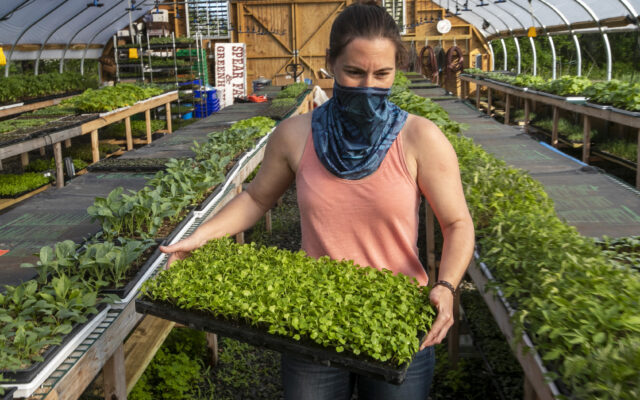
Maine will vote on a ‘right to food.’ It will take a while to find out what it means.
By Michael Shepherd, Bangor Daily News Staff
AUGUSTA — Voters will decide in November on enshrining a right to food in the Maine Constitution, which would continue the state’s pioneering efforts on the topic but likely prompt decades of discussion over what exactly such a right would allow or prevent.
The push in Maine has been part of a broader effort to bolster local food networks that has been led by small farmers and lawmakers from across the political spectrum. It resulted in a first-in-the-nation food sovereignty law in 2017 that allowed cities and towns to disregard certain state food safety laws for goods prepared and sold within their borders.
The constitutional amendment failed twice in the Legislature before it easily advanced to the ballot this year. Voters will be asked to put “a natural, inherent and unalienable right to grow, raise, harvest, produce and consume the food of their own choosing” in a section of the Maine Constitution guaranteeing free speech, the right to firearms and other freedoms.
The change is likely to have limited short-term effects, and the long-term effects are uncertain. It is intended to keep food regulations in place and does not address access to food as some international constitutions do. It could set a limit on future food regulations in state courts and be a main feature in a long debate over how sweeping any new right should be.
“Those kinds of constitutional amendments really are about giving someone standing” in court, said Heather Spalding, deputy director of the Maine Organic Farmers and Gardeners Association. “It’s really hard to say exactly what kind of scenario may crop up in the future that the courts would have to assess, but we don’t have that now and we feel that we should.”
Voters have amended the Maine Constitution 174 times since 1834. New rights have rarely been addressed like this, however. The last time was in 1987, when voters backed an individual right to bear arms that “shall never be questioned” in response to a high court ruling that found a previous state right to firearms extended only to those in militias.
The push for a right to food did not come out of any particular court ruling, but Sen. Craig Hickman, D-Winthrop, who championed earlier versions of the amendment while in the House, has pointed to a federal Food and Drug Administration filing in a 2010 court case on raw milk that said people have “no absolute right to consume or feed children any particular food.”
Hickman has been the major champion of food-related legislation over the past decade in the Legislature, including the sovereignty bill and a 2019 measure committing the state to ending hunger by 2030 that noted 90 percent of food consumed in Maine is imported from out of state. But the amendment this year was sponsored by Rep. Billy Bob Faulkingham, R-Winter Harbor, a lobsterman who led a coalition of backers on the political right and left.
The measure drew some opponents, including the Humane Society of the United States, an animal welfare group that said it could prevent future animal welfare restrictions or lead poachers to challenge hunting laws in court, though the amendment says the freedom would not extend to those who trespass, steal, poach or violate other laws.
But the Sportsman’s Alliance of Maine, which beat the humane society in the latter group’s 2004 and 2014 attempts to ban the most common methods of bear hunting in the state, did not weigh in on the measure because it “didn’t see it as doing a heck of a lot,” said David Trahan, the group’s executive director.
Maine’s historical limits on agriculture, hunting and other food policy areas would be key guideposts for courts deciding how to interpret amendments, said Dmitry Bam, a constitutional law professor at the University of Maine School of Law. He noted that despite the sweeping wording of the amendment, every constitutional freedom is subject to reasonable limits.
“That’s how I think the court would approach these kinds of rights,” Bam said. “If you want to do something that has historically been prohibited, the court would view these historical exceptions as the limit on that right.”
Faulkingham and other supporters have largely billed the change as one that will protect current rights and draw lines against onerous restrictions that authorities could try to implement in decades to come, likening the push to items in the U.S. Constitution that aimed to head off authoritarian leaders that could come along in the future.
“It’s really our protections, our constitutional protections, that prevent it from ever getting to that point,” he said.